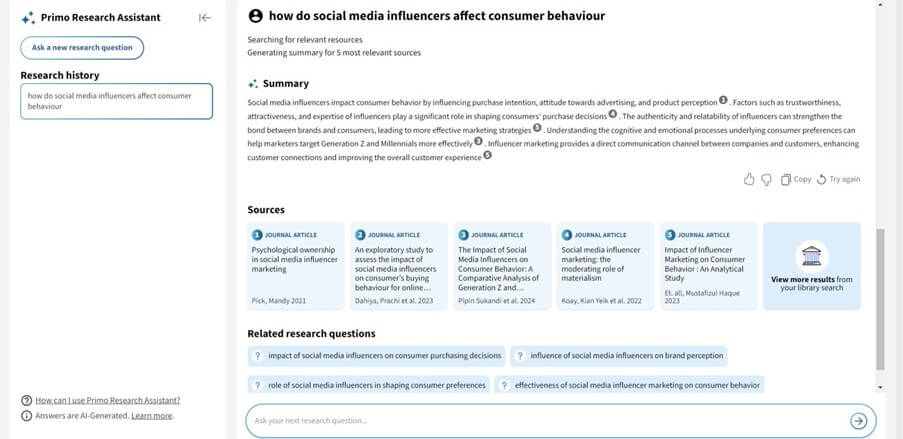Students and researchers are now accustomed to search engines that offer conversational discovery which allows users to “chat” with a search engine using natural language to ask questions and continually refine the answers generated. As a result, navigating the complexities of conventional keyword and Boolean search traditionally used to explore library collections can seem confusing, limited and frustrating.
The intuitive nature of conversational discovery and generative AI tools potentially entices students and researchers to cite less than reliable sources gathered on the internet, rather than credible library materials, out of convenience.
At Ex Libris™, part of Clarivate, we’ve been working with our user community to develop a library discovery service that incorporates the intuitive execution of generative AI to engage patrons to search, explore, and take maximum advantage of trusted library materials.
Introducing Primo Research Assistant
Primo™ Research Assistant transforms library discovery with a new way for users to find and explore materials. Primo Research Assistant harnesses generative AI-powered discovery into the research and learning process, emphasizing transparency, proper accreditation and intellectual property rights.
Primo Research Assistant provides immediate answers to natural language queries and offers visibility into sources and references, so libraries can empower users with a seamless discovery experience, grounded in trusted content, and advance institutional scholarly goals.
Initial functionality for the 2024 release of Primo Research Assistant encompasses:
- Semantic search / Natural language queries
- Answers with references, based on the top five abstracts
- Answers based on results found in the Central Discovery Index (CDI), which contains over 5 billion records and different resource types from thousands of publishers, aggregators, and repositories.
- Links to the full text
- Links to the full result list in Primo
- Search suggestions to help the user expand the topic and learn more about it
- Non-English search and answer support
How does it work?

Image 1: When a student enters the keywords “social media influencers” to search the library catalog from the Primo discovery home page, the Primo Research Assistant search bar appears to the right.

Image 2: Launching Primo Research Assistant to get started on a query to complete a homework assignment or conduct scholarly research.

Image 3: Searching “social media influencers” with the Primo Research Assistant surfaces a summary overview based on information gleaned from library sources. Those sources are included below the summary, making it easy for a user to click and continue their research and learning journey, explore more results, refine their original query or pursue a suggested related research question. Compare the dynamic results with the conventional results in Image 1.
When will Primo Research Assistant be available?
Now in beta testing, we will formally launch the Primo Research Assistant in the fourth quarter of 2024, followed by Summon Research Assistant in Q1 2025; stay tuned for further updates.
This is just the beginning.
We are thinking forward and planning future developments for Primo Research Assistant after this launch. Additional functionalities that we are considering for the future include:
- Local library content (that have abstracts)
- Advanced search – Advanced search capabilities empower users to conduct more precise and effective searches, particularly useful in academic and research settings where specificity and accuracy are paramount.
- Other recommendations (e.g. topics)
- Data visualizations and other graphics
Interested to see Primo Research Assistant in action? Contact us to request a demo.
This is the latest blog post in our monthly series about ongoing developments in AI-enhanced library solutions from Clarivate. Check out the previous article on our Alethea Teaching Assistant.
Explore more of what the Ex Libris library software can offer you.










